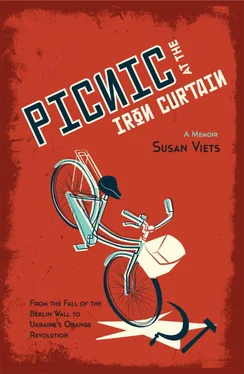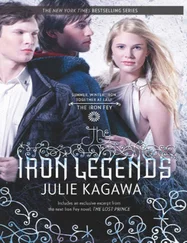Somehow, Marta found me a short while later. We stood shoulder to shoulder as we were nearly the same height. We squeezed closer each minute as more people poured into the square. Soon no space remained and the adjacent streets were just as crammed. Yushchenko came on stage. He called the judges who issued the ruling “heroes.”
“From today Ukraine is a democratic country,” he said. People in the square roared. Everyone looked so proud. More people spoke. When darkness fell, fireworks illuminated the night sky, with bursts of colours that trailed down to the ground. Some reflected on faces turned toward the sky.
The next day I went for a walk to test the mood in the city. The square, so full this past week, was now nearly empty. I crossed through it to the post office on the other side of Khreshchatyk and entered a café inside the building. As I waited for coffee, I overheard a conversation between women about the outgoing president:
“He’s sly,” one of them said.
“He’ll find a way of cheating Yushchenko again,” her friend replied.
I left the café and walked down Khreshchatyk. The tent city still stretched down the street. It looked more entrenched than before. Young guys wove pieces of wood between wire to create a fence around the camp perimeter. I walked up the hill toward the presidential administration and found the atmosphere there more militant than on Khreshchatyk. Protesters blockaded the street with a checkpoint. Flags fluttered in the breeze. They raised a rickety homemade barrier so some cars could pass but blocked others. Tents multiplied, the air even smokier now from more fires in metal drums. Even though the court had ruled in favour of Yushchenko, these protesters still expected they might be tricked. They said they would not go home until new elections had been held.
They would not relax, but I did now. I took a day off to visit Mary’s riding club. We passed near a wealthy enclave as we drove out to the club. “That’s where the presidential administration is holed up,” Mary said.
I had heard about this suburb of columned and turreted mansions along with rumours about the dubious wealth that funded it. I lost track of all the allegations of money laundering, bribes, twisted tax laws and mafia involvement.
“They’re building castles on sand,” Mary told me. Apparently some land in this area was not stable enough to support houses planned for it.
In the evening, Mary and I met Toronto Marta, New York Marta, Nadezhda and other friends for dinner in a restaurant. We sat on wooden chairs. Heaps of varenykyi, Chicken Kiev, mushroom starters and wine stood on the polished wood table. After a few glasses, Mary shouted, “Let’s call Bill!” Someone dialed his number. He answered, surprised by the call.
“Bill, you should be here!” Mary said.
“I can’t. I’ve got responsibilities now,” he replied. I thought of Bill in London, where we had last met. I understood that he’d moved on.
I had as well. I no longer questioned where I belonged. Toronto was my home. But just now I felt somewhere in between. This unexpected meeting up with so many old friends reminded me of past lives in Kiev and London and other places too. So many memories that I had shut away now tumbled out.
I went for a walk in my old neighbourhood. I felt drawn first to Yaroslaviv Val and the building where I fled the man who rang my doorbell all night long. I remembered its genteel shabbiness, apartment buildings that crumbled and potholed roads. I climbed the hill, reached my old building and pinched myself twice in case this was a dream. Then I checked the street address. Was I mistaken? Could this building that looked plucked from central Paris be where I had lived? I scrutinized the facelift, the impeccably painted trim, lights positioned to accentuate architectural details and realized that it was my old building.
Half in a daze, recognizing where I stood but disoriented by such change, I wandered down the street and passed the building where I had lived with Natalia Ivanovna and Ira. I stepped into the courtyard. Then I hesitated. I wanted to go up and ring the bell but did not. Some memories were best left alone.
Once I was back on the street, I peered in the plate-glass windows of shops that displayed elegant patisseries. Then I strolled into Saint Sophia’s Square. I remembered an outbreak of violence in the square just before I left Ukraine. Members of one religious denomination had wanted to bury the head of their church, who had recently died, on the cathedral’s grounds. Barred from entry by the police, they dug up the pavement in front of St. Sophia’s and buried their leader underneath. Fur-clad women now strolled along the sidewalk near the cathedral and browsed in a Vivienne Westwood boutique.
My time in Kiev passed quickly. A few days before I was due to leave, I joined Marta for a talk by a well known professor from Oxford, Timothy Garton Ash, who had recently flown in. We sat with Ukrainian students on wooden chairs in a Kyiv-Mohyla classroom as he analyzed the Orange Revolution. I listened, amazed by his ability to bundle events still unfolding into a tidy theoretical framework. Professor Garton Ash told students the Orange Revolution had transformed Ukraine’s image in the West, but he also said that even though European states applauded the Orange Revolution, the European Union would not (at least not soon) offer Ukraine membership.
“Poland is for us,” someone shouted from the back of the room. The professor said that was not enough. Then he warned that criminals would not be “called to account.” Ukrainians could expect truth, not justice. I wondered about this last point.
After the lecture, Marta stayed at the university. I wanted to buy presents for people at home. I walked back to a souvenir shop on Khreshchatyk where I might find pysanky — Ukrainian Easter eggs. I had received my first one from a high school friend before I even knew Ukraine existed. She didn’t either. We both just marvelled at this beautiful, intricately painted egg and wondered who had made it.
The shop was located on the ground floor of the Union of Journalists building. As I approached, I noticed a small memorial plaque on a wall. I stopped and read the plaque. To my surprise, it listed the names of journalists who had died under suspicious circumstances. I checked each letter twice to be certain that I made no mistake about the first name there. Vadym Boyko. He had made the list and was not forgotten, though his murder had never been solved. This still upset me and I was sure it always would, but I did feel happy to see this plaque commemorating Vadym and other colleagues.
I thought of Vadym as I browsed in the store. Distracted, I left empty-handed. I walked back down Khreshchatyk, up a steep hill toward St. Sophia’s Cathedral and over to Andrivskyi Spusk. The walk cleared my mind and returned me to the present. I browsed souvenir stalls that lined the street for pysanky .
I would have a dinner date when I returned to Toronto with someone who made my heart flutter. I thought of him now and bought him an egg. Two finely painted roosters surrounded by geometric designs decorated the shell. He was not Ukrainian, so he might not know about these eggs, but it meant a lot to me to give him one. I had my own collection and had carried each piece home by hand. As I stood on one of the earliest streets in Kiev with my pysanka , a painted egg first made in ancient times, I realized again how much older this culture was than mine. I returned through St. Sophia’s Square to Khreshchatyk. I passed by the tent city, where protesters still held signs for free and fair elections. They would come soon I knew, but this democracy would be a fragile one. As with my egg, too much pressure might crack a hollow shell. But for now, it was something beautiful to watch.
Читать дальше












